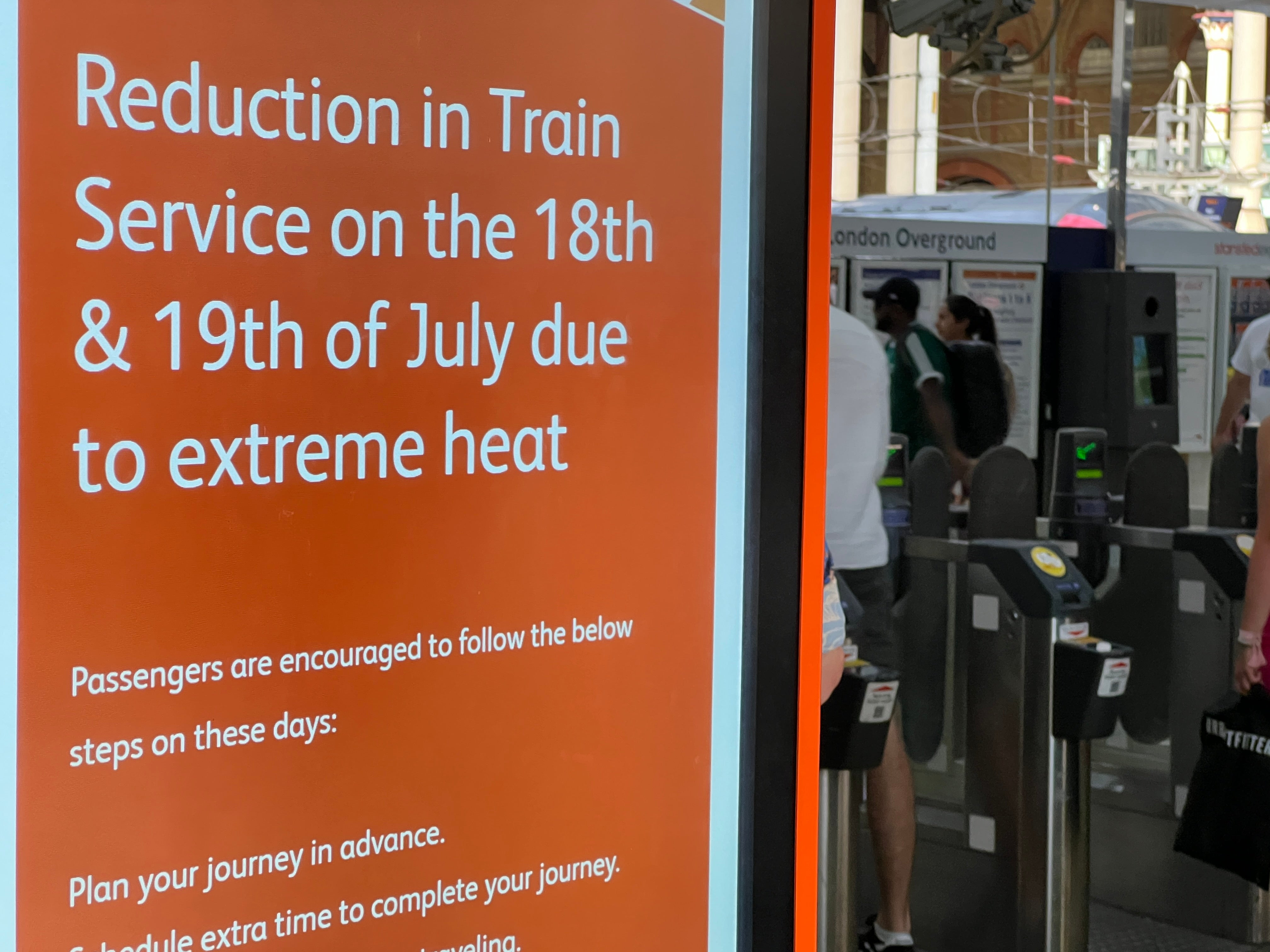Rail meltdown: hundreds of trains cancelled as speed restrictions begin
East Coast main line will close completely from noon to 8pm on Tuesday

Rail passengers face widespread train cancellations and delayed journeys as operators prepare for expected extreme temperatures.
Dozens of early long-distance trains were axed on Monday morning – with the unprecedented closure of a key inter-city line set for Tuesday.
Passengers in England and Wales are being warned not to travel unless absolutely necessary. With many services cancelled, travellers who do attempts journeys are warned to expect crowded and delayed trains.
In extreme heat, steel rails are susceptible to buckling. To reduce the stress on the rails, the normal running speed of 125mph is reduced to 90mph or 60mph, with some stretches – typically in sheltered, south facing, “sun trap” locations – as slow as 20mph.
At the neighbouring stations of King’s Cross and St Pancras International in central London, some departures on the East Coast main line to Leeds and York were cancelled as LNER – the main train operator to Yorkshire, Tyneside and Scotland – thinned out services.
On Tuesday afternoon and early evening, no trains will run at all.
LNER’s managing director David Horne, tweeted: “Our trains will run at a reduced speed of 60mph between York and London this afternoon. Please only travel if necessary and thank you for your patience if your journey takes longer than usual.
“The rail industry has taken the very difficult decision to close the East Coast main line between York/Leeds and London on Tuesday 19 July when temperatures are due to peak at 39C.
“I’m sorry if this will disrupt your journey plans but the safety of everyone must come first.”
Lumo, the rival train operator between London and Edinburgh, is running some services only between Newcastle and the Scottish capital. Grand Central, which links Wearside and West Yorkshire with King’s Cross, says: “Only a couple of our services are running in each direction.”
Passengers with tickets for travel on Monday or Tuesday can use their tickets later in the week or claim a full refund.
At St Pancras International, East Midlands Railway has cancelled at least half of its inter-city links from Sheffield, Derby, Nottingham and Leicester to London St Pancras. The first arrival from Sheffield ran 15 minutes late due to speed restrictions.
Early international trains to and from Paris on Eurostar were delayed by an hour due to overhead power supply problems near the French capital. The Channel Tunnel train operator says, despite the heat: “Eurostar trains are currently expected to operate as normal.”
Avanti West Coast is cancelling many trains from Birmingham and Manchester to London.
GWR is halving frequencies from London Paddington to Cardiff and Bristol.
The train operator says: “Customers who choose to travel despite the warning are being advised to check their journeys before travelling and ensure they are well-prepared for the extreme conditions – wearing cool clothes, taking handheld fans and ensuring they have plenty of water to drink.
“Vulnerable passengers and those with health conditions should avoid travelling on these days.”
With the highest temperature expected on Tuesday, line closures are expected in northern England. Northern Trains says: “Some routes will be closed completely, especially on Tuesday in the North East, Yorkshire and Humber and you should not attempt to travel as there will be no alternative options.”
All London Underground lines are operating a reduced service.
The AA is warning motorists of melting roads and potential blowouts – and says a car’s interior can reach 60C.
“Those in older cars not recently serviced, without air conditioning, are advised to consider whether they should be travelling at all,” says the organisation.
Setting off as early in the morning as possible can reduce the chances of your engine overheating as the air temperature is reduced at this time of the day. Road surfaces are also likely to be cooler – meaning that your car’s tyres are less likely to reach temperatures high enough for pressures to increase.
There is a greater danger of tyre blow-outs in extreme temperatures.
In case of breakdown carry plenty of water – at least one litre per person travelling.
Last summer the AA attended an average of two cases per day where children or pets had been accidentally locked in cars – along with the keys.
Join our commenting forum
Join thought-provoking conversations, follow other Independent readers and see their replies
Comments
Bookmark popover
Removed from bookmarks